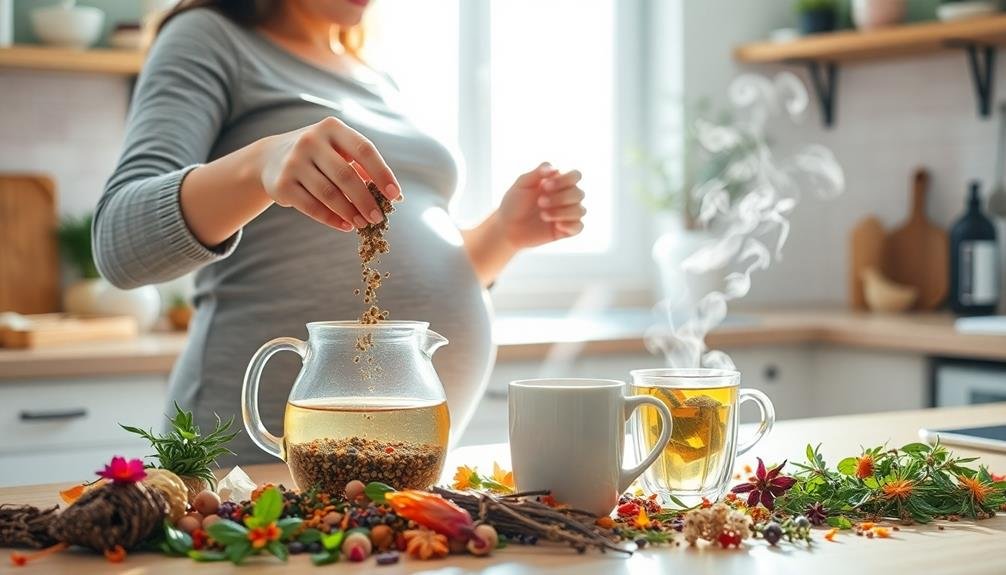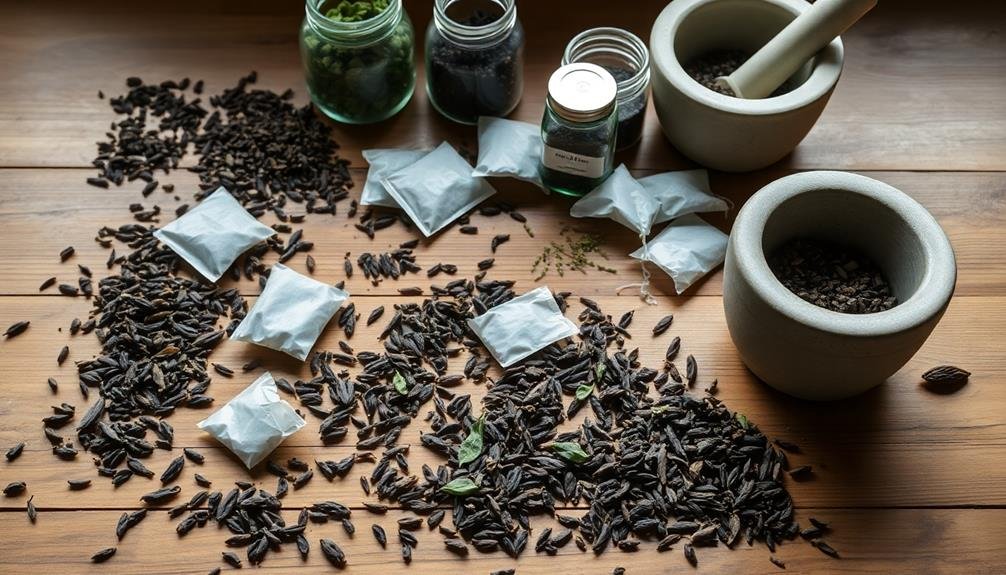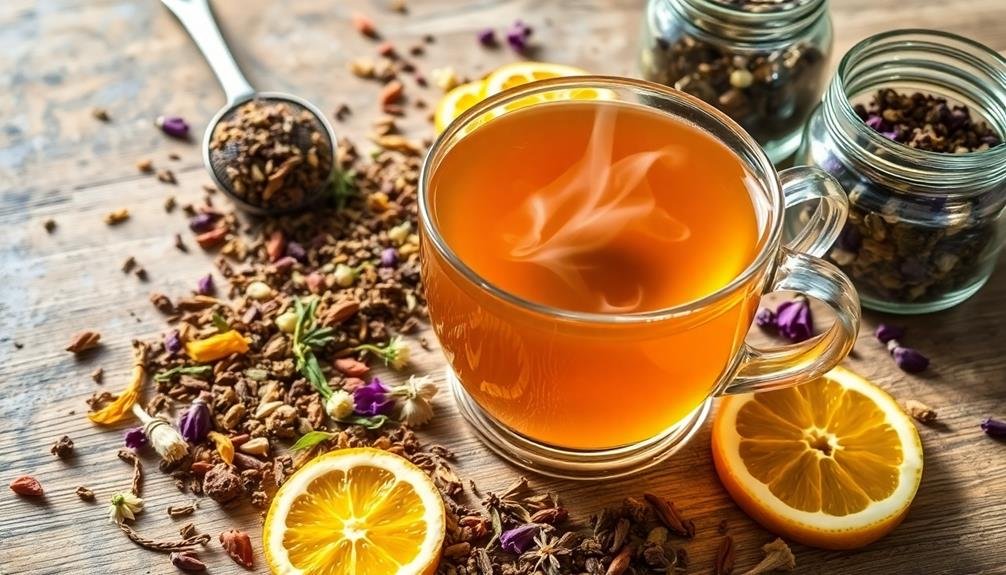Brewing your own pregnancy-safe herbal tea blends can provide numerous benefits, from easing morning sickness to boosting your immune system. Start with safe herbs like red raspberry leaf, peppermint, ginger, and chamomile. You'll need basic equipment like infusers, storage containers, and measuring tools. Try a ginger and lemon blend for nausea relief or a chamomile and lavender mix for relaxation. Always consult your healthcare provider before introducing new herbs, especially in the first trimester. Use organic, loose-leaf herbs and store your blends in airtight containers in a cool, dark place. By creating your own blends, you'll reveal a world of customized, natural support for your pregnancy journey.
Benefits of Herbal Teas During Pregnancy

Sipping on herbal teas during pregnancy can offer a range of benefits for expectant mothers. These natural brews provide hydration, essential nutrients, and potential relief from common pregnancy discomforts.
You'll find that many herbal teas can help alleviate morning sickness, reduce bloating, and ease digestive issues. Certain herbal blends may boost your immune system, which is vital during pregnancy when your body is more susceptible to infections.
Some teas, like raspberry leaf, are believed to strengthen the uterus and prepare it for labor. You'll also benefit from the calming effects of chamomile or lemon balm, which can help reduce stress and promote better sleep.
Herbal teas are often rich in antioxidants, supporting your overall health and potentially reducing the risk of complications. They're a great alternative to caffeinated beverages, helping you stay hydrated without the stimulating effects of coffee or black tea.
Many pregnant women find that sipping on warm herbal tea provides comfort and helps them maintain a healthy fluid intake. Remember to consult your healthcare provider before incorporating new herbal teas into your diet, as some herbs may not be suitable during pregnancy.
Safe Herbs for Pregnancy Tea
A pregnancy-safe tea blend relies on carefully selected herbs that offer benefits without potential risks. You'll want to focus on herbs known for their gentle, nourishing properties and avoid those with strong medicinal effects. Some safe options include:
| Herb | Benefits |
|---|---|
| Red Raspberry Leaf | Uterine tonic, rich in minerals |
| Peppermint | Eases nausea, aids digestion |
| Ginger | Relieves morning sickness, reduces inflammation |
| Chamomile | Promotes relaxation, improves sleep |
When brewing your tea, use organic herbs whenever possible to avoid pesticide exposure. Steep your chosen herbs in hot water for 5-10 minutes, depending on desired strength. You can combine multiple herbs for a more complex flavor and varied benefits.
Remember to introduce new herbs gradually and in small amounts. While these herbs are generally considered safe, it's always best to consult with your healthcare provider before adding any new herbs to your diet during pregnancy. They can provide personalized advice based on your specific health needs and any potential contraindications with medications you may be taking.
Essential Equipment for Tea Blending

To create your own pregnancy-safe herbal tea blends, you'll need some essential equipment.
Start with basic tea-making tools like infusers, strainers, and a kettle.
You'll also want to invest in airtight storage containers to keep your herbs fresh, along with precise measuring spoons and a small digital scale for accurate blending.
Tea-Making Tools
Tea enthusiasts looking to create their own pregnancy-safe herbal blends will need a few essential tools. A kitchen scale is vital for accurately measuring ingredients, ensuring consistent and safe proportions. Opt for a digital scale that measures in grams for precision.
You'll also need airtight storage containers to keep your herbs fresh and prevent cross-contamination. Glass jars or BPA-free plastic containers work well. Don't forget to label them with the herb name and purchase date.
A tea infuser or reusable tea bags are necessary for steeping your custom blends. Choose stainless steel mesh infusers or unbleached cotton tea bags for the best results. A teapot with a built-in infuser can be a convenient all-in-one solution.
For mixing your blends, invest in a large mixing bowl and a wooden spoon or silicone spatula. These tools allow you to combine herbs thoroughly without damaging delicate leaves.
Lastly, consider getting a tea journal to record your recipes, tasting notes, and any adjustments you make. This will help you refine your blends and keep track of which combinations work best for you during pregnancy.
Storage Containers
Proper storage containers play a key role in preserving the quality and safety of your herbal tea blends. To maintain the freshness and potency of your herbs, you'll want to invest in airtight containers that protect against moisture, light, and air exposure.
Glass jars with tight-fitting lids are an excellent choice, as they're non-reactive and won't absorb odors or flavors. Opt for amber or cobalt blue glass to shield your herbs from harmful UV rays.
If you prefer a lighter option, food-grade stainless steel containers are durable and won't rust or corrode. For larger quantities, consider using resealable mylar bags with oxygen absorbers. These flexible pouches are ideal for long-term storage and take up less space than rigid containers.
Label your containers clearly with the blend name and date of preparation. This practice helps you track freshness and rotate your stock effectively.
Store your containers in a cool, dry place away from direct sunlight and heat sources. Avoid keeping them near strong-smelling substances, as herbs can absorb odors easily.
With proper storage, your pregnancy-safe herbal tea blends will remain flavorful and potent for months.
Measuring and Weighing Devices
Accurate measuring and weighing devices are essential for creating consistent, safe herbal tea blends during pregnancy. You'll need a reliable digital scale that measures in grams and ounces, with a precision of at least 0.1 grams. This guarantees you're using the correct amount of each herb, especially for potent ingredients that require careful dosing.
For volume measurements, invest in a set of measuring spoons and cups. Look for stainless steel or glass options that are easy to clean and won't retain odors. A set of nested measuring spoons ranging from 1/8 teaspoon to 1 tablespoon will cover most of your needs.
Here's a quick guide to essential measuring tools:
| Tool | Use | Precision |
|---|---|---|
| Digital scale | Weighing herbs | 0.1g |
| Measuring spoons | Small volumes | 1/8 tsp – 1 tbsp |
| Measuring cups | Larger volumes | 1/4 cup – 1 cup |
| Tea scoop | Single servings | 1-2 tsp |
Don't forget a dedicated tea scoop for portioning out your finished blends. A standard tea scoop typically holds 1-2 teaspoons, perfect for a single serving. With these tools, you'll be able to create precise, pregnancy-safe tea blends with confidence.
Ginger and Lemon Nausea-Relief Blend
A powerful ally in combating morning sickness, the Ginger and Lemon Nausea-Relief Blend combines two pregnancy-safe ingredients known for their stomach-soothing properties.
Ginger's active compounds, gingerols and shogaols, help reduce nausea and vomiting, while lemon's citrus scent can alleviate queasiness.
To brew this comforting blend, you'll need:
- 1 tablespoon fresh ginger, grated
- 1 organic lemon, thinly sliced
- 2 cups of filtered water
- 1 teaspoon of honey (optional)
Bring the water to a boil in a small saucepan. Add the grated ginger and lemon slices, then reduce heat and simmer for 5-10 minutes.
Strain the tea into your favorite mug and add honey if desired. Sip slowly and enjoy the warming, soothing effects.
For maximum benefit, drink this tea in the morning or whenever nausea strikes. You can also prepare a larger batch and store it in the refrigerator for up to three days.
Remember to consult your healthcare provider before incorporating any new herbal remedies into your pregnancy routine, especially if you have any pre-existing conditions or concerns.
Relaxing Chamomile and Lavender Mix

When pregnancy stress and sleepless nights set in, turn to the soothing combination of chamomile and lavender. This gentle blend offers a natural way to unwind and promote relaxation during your pregnancy journey.
Chamomile has long been prized for its calming properties, while lavender is known to reduce anxiety and improve sleep quality.
To create this blend, you'll need dried chamomile flowers and dried lavender buds. Mix one part lavender with three parts chamomile for a balanced flavor. Steep one tablespoon of the mixture in hot water for 5-7 minutes, then strain and enjoy. You can add a touch of honey for sweetness if desired.
While generally safe, it's important to use chamomile and lavender in moderation during pregnancy. Consult your healthcare provider before incorporating any new herbal teas into your routine. Some women may experience mild allergic reactions, so start with small amounts to test your tolerance.
For best results, enjoy this calming blend in the evening as part of your bedtime routine. You'll likely find that the aromatic scent and soothing warmth help you relax and prepare for a restful night's sleep.
Nutrient-Rich Red Raspberry Leaf Infusion
Red raspberry leaf tea is renowned for its potential benefits during pregnancy, including uterine toning and mineral support.
You'll want to brew this infusion by steeping 1-2 teaspoons of dried leaves in hot water for 10-15 minutes, then straining before drinking.
While generally considered safe, it's essential to consult your healthcare provider before adding red raspberry leaf tea to your pregnancy routine, especially in the first trimester.
Benefits During Pregnancy
Packed with vital nutrients, red raspberry leaf infusion offers numerous benefits for expectant mothers. This herbal tea is rich in vitamins and minerals that support a healthy pregnancy, including iron, calcium, and magnesium.
It's also known for its uterine tonic properties, which may help strengthen and tone the uterus in preparation for labor.
As you sip on this nourishing brew, you'll be pleased to know that it can provide relief from common pregnancy discomforts. Red raspberry leaf tea is believed to:
- Reduce morning sickness and nausea
- Ease leg cramps and swelling
- Improve sleep quality
- Increase milk production postpartum
Many midwives and herbalists recommend drinking red raspberry leaf tea throughout pregnancy, especially in the third trimester.
However, it's important to consult with your healthcare provider before adding any new herbal supplement to your routine. They can advise you on the appropriate dosage and frequency based on your individual needs and medical history.
Proper Brewing Techniques
Now that you're aware of the benefits, let's focus on how to prepare this nutrient-rich brew. To make a potent red raspberry leaf infusion, you'll need 1 ounce of dried leaves per quart of water.
Begin by boiling the water in a non-reactive pot, then remove it from heat. Add the dried leaves and cover the pot with a tight-fitting lid. Let the mixture steep for at least 4 hours or overnight for maximum nutrient extraction.
After steeping, strain the liquid through a fine-mesh sieve or cheesecloth. You can drink the infusion hot or cold, but don't reheat it, as this may diminish its nutritional value. Store any leftover infusion in the refrigerator for up to 48 hours.
For a milder tea, use 1-2 teaspoons of dried leaves per cup of boiling water and steep for 10-15 minutes. This method is quicker but less potent than the long-infusion technique.
Remember to start with small amounts and gradually increase your intake. It's best to consult your healthcare provider before incorporating any new herbal preparations into your pregnancy routine.
Safety Considerations
While red raspberry leaf infusion's benefits are numerous, it's crucial to take into account safety precautions during pregnancy. Always consult your healthcare provider before adding any herbal tea to your routine, especially if you're in your first trimester or have a high-risk pregnancy.
When brewing your red raspberry leaf infusion, follow these safety guidelines:
- Use organic, loose-leaf herbs to avoid potential pesticides and contaminants.
- Start with a weak brew and gradually increase the strength as your body adjusts.
- Limit your intake to 1-2 cups per day, unless otherwise advised by your doctor.
- Stop drinking the infusion immediately if you experience any unusual symptoms or contractions.
Remember that while red raspberry leaf is generally considered safe for most pregnant women, individual reactions can vary.
Pay attention to your body's responses and don't hesitate to reach out to your healthcare provider if you have any concerns. As with any herbal remedy, moderation is key.
Storing and Preserving Homemade Blends

Once you've crafted your perfect pregnancy-safe herbal tea blend, proper storage is crucial to maintain its freshness and potency.
Store your homemade blends in airtight containers, preferably made of glass or ceramic, to protect them from moisture and light. Keep these containers in a cool, dark place, away from direct sunlight and heat sources.
Label each container with the blend's name, ingredients, and date of creation. This practice helps you track freshness and avoid confusion between different blends. Most herbal tea blends will stay fresh for about six months to a year when stored correctly.
To preserve the flavor and medicinal properties of your blends, avoid storing them near strong-smelling foods or spices.
Don't mix new batches with older ones, as this can compromise the overall quality of your blend.
If you notice any signs of mold, unusual odors, or discoloration, discard the blend immediately. It's better to err on the side of caution, especially during pregnancy.
Consider making smaller batches more frequently to guarantee you're always enjoying the freshest, most potent blends throughout your pregnancy journey.
Frequently Asked Questions
Can I Drink Caffeinated Teas While Pregnant?
You should limit caffeine during pregnancy, but you can have some. It's best to stick to 200mg or less per day. That's about 1-2 cups of caffeinated tea. Always check with your doctor for personalized advice.
How Much Herbal Tea Is Safe to Consume During Pregnancy?
You should limit your herbal tea intake during pregnancy. Stick to 1-2 cups daily of pregnancy-safe teas. Avoid unknown or potentially harmful herbs. Always consult your healthcare provider before consuming any herbal teas while pregnant.
Are There Any Herbs I Should Avoid Completely When Pregnant?
Yes, you should avoid certain herbs during pregnancy. Don't consume licorice root, parsley, sage, yarrow, or pennyroyal. These can be harmful to your baby. Always consult your healthcare provider before using any herbal products while pregnant.
Can Herbal Teas Interfere With Prenatal Vitamins or Medications?
Yes, some herbal teas can interfere with prenatal vitamins and medications. You'll want to consult your doctor before drinking any herbal teas while pregnant. They can advise you on potential interactions and safe options for you.
Is It Safe to Use Sweeteners in Pregnancy Herbal Teas?
You can safely use natural sweeteners like honey or stevia in moderation. However, avoid artificial sweeteners during pregnancy. It's best to consult your doctor about specific sweeteners and their safety for your individual situation.
In Summary
You've now got the knowledge to create your own pregnancy-safe herbal tea blends. Remember to always consult your healthcare provider before trying new herbs. With these recipes and tips, you'll be able to sip on comforting, beneficial teas throughout your pregnancy. Don't be afraid to experiment with different combinations to find your perfect blend. Enjoy the process of crafting your own teas, and savor the moments of relaxation they bring during this special time.





Leave a Reply